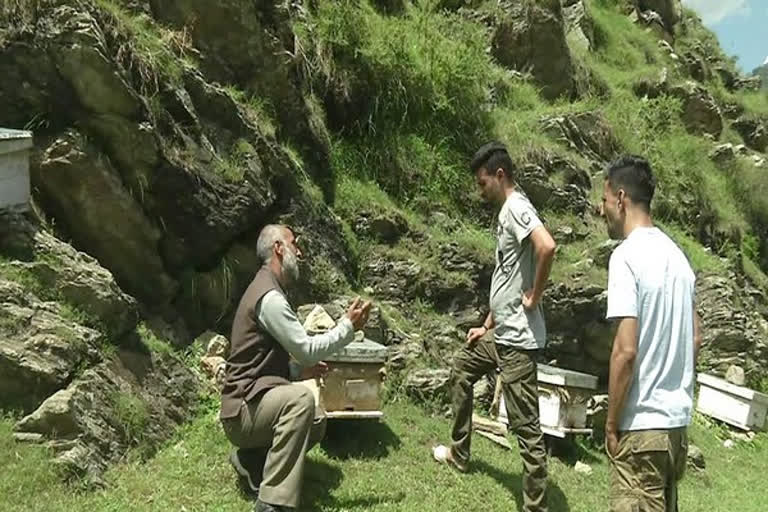Doda: Apiculture or beekeeping is an age-old-tradition in Jammu and Kashmir. With scientific interventions, it is emerging as a lucrative business in the state, generating more income and employment opportunities for locals.
The tourism sector is witnessing a surge in the state with beekeeping. Areas in and around Bhaderwah town of Doda district, such as Bhalla and Sarthal, have emerged as hotspots for honeybee tourism as they have an abundance of flowering plants -- one of the major requirements for successful beekeeping.
Tourists are visiting these areas both to relax in the lap of nature and learn the nuances of apiculture.
One of the tourists Amir Sohrawardi said, "Though we came to Sarthal because of its captivating landscapes, the apiculture that is practised here gave us another reason to stay. I believe apiculture has a lot of potentials and if it is harnessed adequately, then honey from Jammu and Kashmir can even be exported to other countries."
Beekeeping is the only industry which not only produces honey and beeswax but also assists in enhancing crop-production through the pollination process.
This particular industry does not require much investment except the material in the form of nectar and pollen from flowers, which is easily available in the natural surroundings of Jammu and Kashmir. Moreover, the presence of large swathes of forests and negligible use of pesticides in cropped lands provide a conducive atmosphere for the production of organic honey.
Beekeepers in Sarthal are trying their level best to tap this potential of natural resources. They are using indigenous honeybees, 'Apis cerena indica', which are even instrumental in enhancing agricultural productivity as they are natural pollinators for a range of fruits and crops.
Along with this, beekeepers in this area practice migratory beekeeping that increases honey production manifold as compared to stationary ones.
An official from the Apiculture Department, Mohammad Shabir said, "We have been placing these honeybee boxes in Sarthal for the last 25-30 years. The season starts from April and continues till August and then the honeybees are migrated. A lot of tourists come in this season to see these honeybees, their honey is also in much demand."
Presently, Jammu and Kashmir imports honey worth Rs. 8.5 million from other states, but if its honeybee keeping potential is effectively utilised, it will not only help in attracting tourists but also provide a livelihood to many people in the state.
Also, read: LIVE: LS takes up for discussion Insolvency Code (Amendment) Bill



